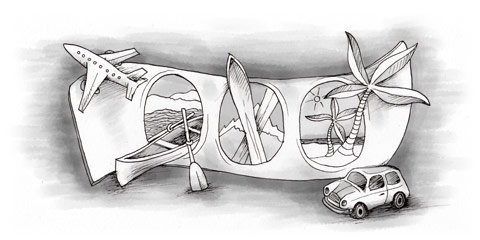In order to see even the most hidden corners of Poland, having a car, whether rented, imported or bought in Poland, is a great option.
Renting a car
Renting a car in Poland is the easiest way to see the country at your own pace and rhythm. However, some restrictions apply when renting a car as a foreigner. Each rental company has different rules, which means you will have to search and compare the companies in order to determine which best suits your needs.
The legal driving age in Poland is 18 years of age, but most companies will not rent a car to anyone under 25 years old. If a company does rent to younger people, you are most likely to be charged a higher rate and required to purchase extra insurance. On the other end of the spectrum, if you are over 70 years old you might have an equally hard time finding a place to rent a car in Poland.
To rent a car in Poland you must present an internationally valid license or a license from the EU. People from the United States and Canada can use an International Driver’s Permit (IDP) which allows them to drive in Poland for a validity period of 6 months. You must check with your licensing authorities and with Poland’s traffic regulations whether a license from your home country is valid or if you have to obtain an international permit.
Major multinational companies (such as Europcar ) are available in Poland for renting a car. However, there are a significant number of smaller, local companies that are likely to offer cheaper rates with less restrictions. Most companies include a certain amount of insurance in their costs, but it is recommended to be fully covered by your own insurance, as well as checking that your private insurance covers any damage done to you, the vehicle, or third parties in case of accident.
With rental cars it is possible to travel to other EU Member States, but you must check with the company you are renting with. There are certain countries, i.e. Albania, Bosnia, Belarus, Bulgaria, Croatia, Estonia, Latvia, Lithuania, Macedonia, Moldova, Montenegro, Russia, Slovenia, Slovakia, Turkey and Ukraine, where arriving with a rental car from Poland is prohibited.
Importing a car
If you are keen on bringing your car into Poland with you instead of buying or renting one, you can certainly do so. However, you can only bring one item with you (whether it’s a vehicle, a motorcycle or a trailer).
In order to import a vehicle into Poland, the following documentation is required:
- Original car documents to prove ownership;
- Original registration documents - it must be registered in the current owner’s name;
- If the car was purchased less than 6 months prior to entrance, an invoice must be provided to show the value of the car;
- If the car is second-hand, a bill of the sale or value declaration signed by the owner must be provided;
- Insurance of the vehicle.
In order to be exempt from duties and tariffs, you must provide proof of possession of the vehicle for a minimum of 6 months prior to going through customs. Vehicles imported from EU Member States are free from duties and tariffs, but the driver must pay excise tax. If the car is older than 6 months and has over 6,000 km on the clock, the excise tax is paid in Poland. However newer cars must pay an excise tax dependant on the age and size of vehicle and engine, and 22% VAT. If the car is being exported from outside the EU, all duties and taxes must be paid.
Usually, you must also complete a notarized power of attorney to agree for the shipping company to handle the import. Should this not be provided, you must be present at customs for the clearance process. This can take up to 2 days.
Within the first year of import, the imported vehicle cannot be sold, lent, rented, liened or let to another person. Should you infringe this, you must pay a debt to customs. The value of this debt varies based on the condition the vehicle is in, its value and the duties and tariffs paid when the import was first made.

